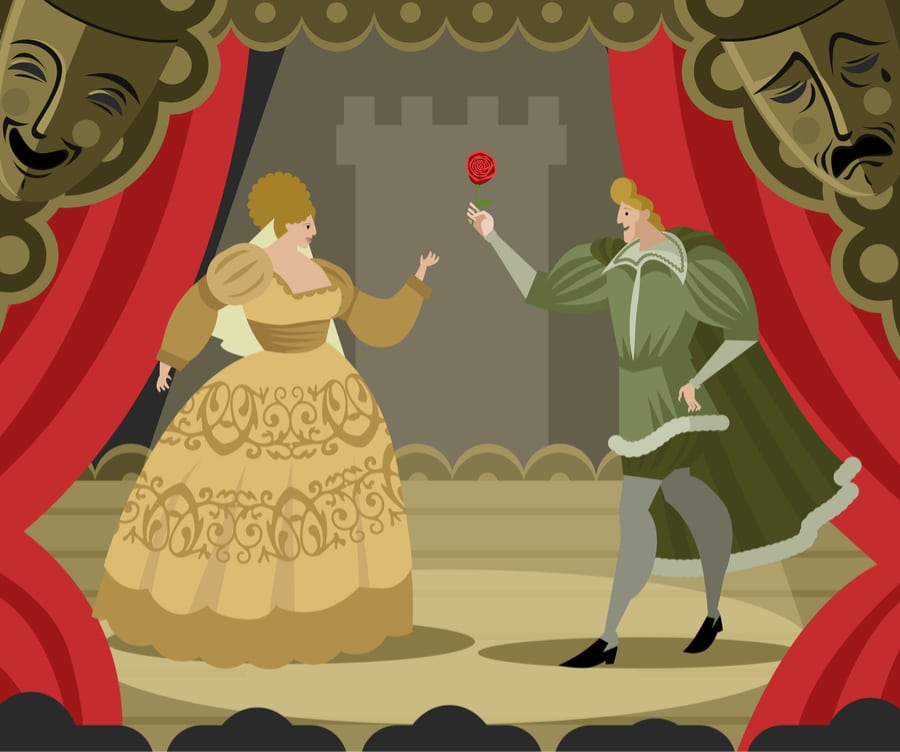Ahead of delivering his specialised Directing for Theatre Training Certificate at Maynooth University, Peter Hussey (Artistic Director of Crooked House Theatre Company) has collected a few words of wisdom from local Kildare Youth Theatre members.
Established in 1996 by Crooked House Theatre Company, Kildare Youth Theatre has a history of presenting ambitious work, influenced by European theatre-making and Irish narrative traditions. Using Crooked House’s network of European connections, and availing of the EU’s Erasmus+ programme, these young people are able to collaborate with several youth theatre-making projects a year across the continent.
After intensive theatrical training and experience, these talented young creatives reflect on what they’ve learned. Here are a few tips they hope to share with any young group starting out with Shakespeare.
Things to get right if you want to do Shakespeare with young people.
Charlie (17):
- Distinguish between thoughts: Shakespeare is just as varied as modern speech – and like modern day humans, thoughts vary wildly and without notice, and this needs to be drilled into an actor’s head
- The iambic pentameter: Needless to say this should be thought on day one.
- Research: More research is needed than your average vanilla, modern-day script. Words need to be explained, phrases need to be understood and the concept of what is wrong and right in that period of time. Teach them these things.
- Be patient and forgiving: Shakespearean language brings with it an extreme learning curve and so it can take some people quite a long time to adapt and comprehend the changes.
Colin (16):
- Balance between serious rehearsing and creating a fun atmosphere: Although it is important at the end of the day to put on an amazing performance, the factor of enjoyment during rehearsals should never be forgotten.
- Deep explanations of line meanings: Lines can be very hard to grasp when you are inexperienced in reading this type of English so the meaning of lines is not always easy to decipher. Help must always be there for this.
- Ensuring that school work and other extra-curricular activities are balanced with rehearsing: Rehearsal times should always be agreed upon by the cast and director to ensure everyone will be able to attend the vast majority of the time. It also creates a calmer attitude towards the play as there will be fewer stand-ins with this approach
Doug (17):
- Casting: Unlike other plays, in Shakespeare, it is difficult to know what the character is really like. Time spent looking into each character and their development would help the actor & (casting) director make a more informed choice.
- Understand the text: Before acting out scenes, understanding what the words mean and what they suggest really help.
- Don’t freak out! Some of the time, doing Shakespeare can make one think: ‘What have I got myself into?’ but it all comes together in the end. i.e. We have our good days and our bad days.
- Cherish each line: Shakespeare is packed with meaning; depending on how the actor wants their character portrayed, the text’s meaning can be manipulated.
Elliot (17):
- Patience: Some young people don’t get it as quickly as others, but they will. English class scares young people with Shakespeare. It should be embraced because if it is done slowly and concisely, everyone will get a grip on it.
- Emphasise the importance of cues and dovetailing: In Shakespeare, as his plays are so wordy, these can fall flat on their faces if they aren’t snappy and energetic.
- Make it fun: Of course, the language and context have to be analysed. But once that’s done, play with the scenes, do something totally outrageous that won’t make it to final production (or maybe it might). But through playing with it understanding comes too. You have to dirty up Shakespeare.
Lee (19):
- Ease people into the world of Shakespeare: It’s not like anything else out there. It’s practically its own genre of acting.
- Let them get to know the characters: These are characters that have been performed for hundreds of years. See if they can discover something new about them.
- Make sure they have a comprehension of the text: The more they understand, the more they will become interested and the better the performance.
- Make sure to ask them for their own opinions: Young people’s opinions are often overlooked. Ask them about various aspects of their characters, costumes or props.
- Make sure they enjoy it: The more they enjoy it, the smoother the process. Don’t rush them; let them take command of who they are as long as it’s reasonable. In the end, they’re the ones performing on stage.
Some fantastic advice from up-and-coming young talent. Is this a field you’re interested in? Whether you’re already working in theatre and want to upskill/or transition roles, or perhaps you have no experience in the field whatsoever, Maynooth University has you covered with their intensive Directing for Theatre training programme.
This Certificate in Directing for Theatre is an accredited Level 7 course. Taught by creative professionals, it focuses on methods, tips, techniques, application of theory, and practice, which means it’s a perfect first step towards a career you love.












Comments